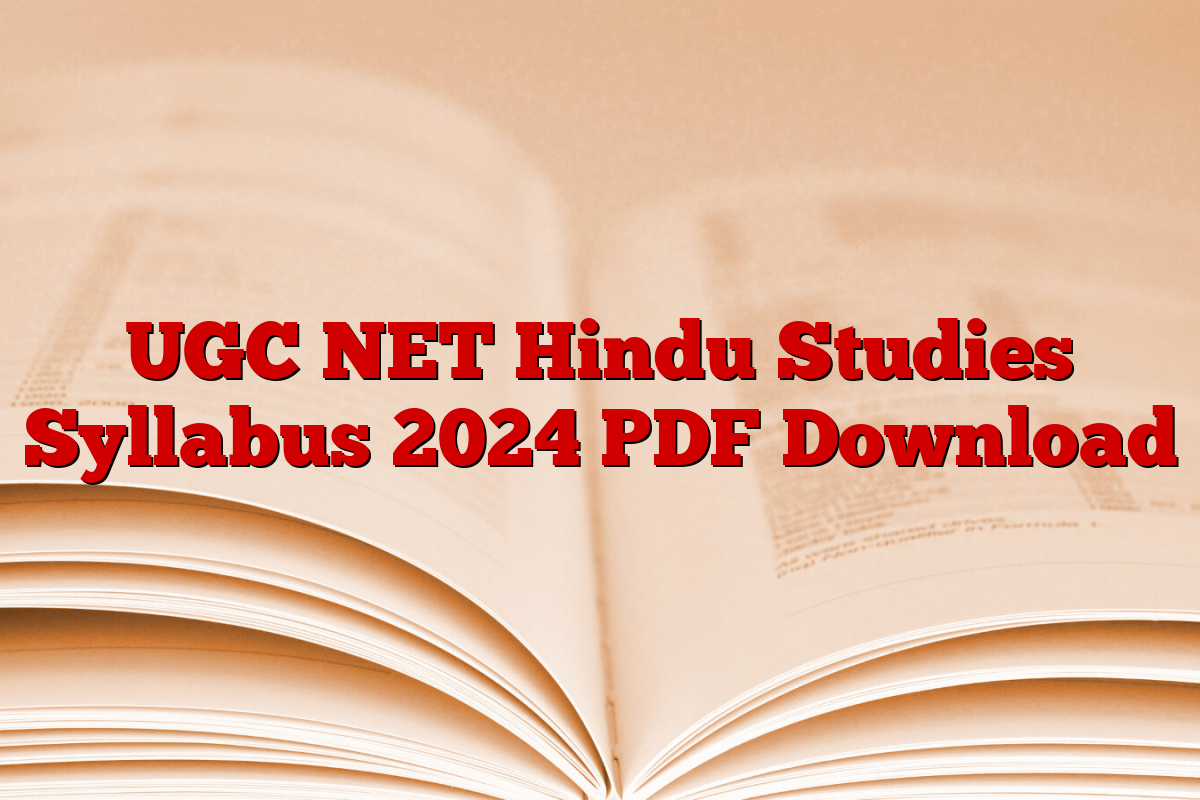UGC NET is a national level examination that tests a candidate’s eligibility to be appointed as a lecturer or pursue a research career in top universities in India. The exam is divided into 2 papers. Paper II is subject-specific and Hindu Studies is one of the major subjects chosen by the candidates. UGC has released the UGC NET Hindu Studies Syllabus 2024. Candidates preparing for UGC NET exam are advised to review the UGC NET Hindu Studies Syllabus 2024 carefully before starting their preparation. This article presents detailed information on UGC NET Hindu Studies Syllabus 2024 for the convenience of the candidates.
UGC NET Hindu Studies Syllabus 2024 – Overview
Candidates who are looking for UGC NET Hindu Studies Syllabus and Exam Pattern have come to the right destination. Syllabus of Paper I and II is available on this website. Here, we will provide you all the details required for UGC NET Hindu Studies Exam 2024.
| UGC NET Hindu Studies Syllabus 2024 | |
| name of exam | UGC NET 2024 |
| steering body | National Testing Agency |
| Place | National level |
| Paper I | 50 |
| Paper II | 100 |
| official website | https://ugcnet.nta.ac.in/ |
ugc net hindu studies syllabus
UGC NET Hindu Studies Syllabus 2024 is available on the official website. To crack the UGC NET exam 2024, candidates must be fully prepared for the comprehensive UGC NET. UGC NET Paper 1 lasts for one hour and carries a total of 100 marks and UGC NET Hindu Studies Paper 2 carries questions for 200 marks and lasts for two hours.
ugc hindu studies exam pattern
UGC NET 2024 exam of December cycle will be held in January 2025. So, now is the time to get familiar with the UGC NET Hindu Studies Exam Pattern 2024. The UGC NET exam is divided into two papers, which last for a total of three hours. , NET 2024 exam consists of objective type questions in multiple choice format.
Paper 1 is common for all applicants. However, Paper 2 is subject-specific. The UGC NET syllabus of Hindu Studies is huge, so preparation for the exam should start early. Many important sub-topics are also included in the syllabus for smooth exam preparation. The UGC NET Hindu Studies syllabus presented here will help you identify the important parts of each subject and build a solid study schedule.
UGC NET Hindu Studies Syllabus for Paper II
Paper II of UGC NET Hindu Studies exam will cover 10 units. There will be 100 questions in this exam, each question will be of two marks. It is mandatory to attempt each question. Units are available below for UGC Hindu Studies Syllabus PDF for Paper II which candidates can review.
| UGC Hindu Studies Syllabus Paper II | |
| Unit | Description |
| Unit 1: Philosophy |
|
| Unit 2: Dharma and Karma Discussion |
|
| Unit 3: Rebirth-Bandhan-Moksha Discussion |
|
| Unit 4: Proof Theory |
|
| Unit 5: Vada Tradition |
|
| Unit 6: Applicability of Western Methods to Understanding Indian Texts |
|
| Unit 7: Ramayana |
|
| Unit 8: Mahabharata |
|
| Unit 9: Sanskrit Parichaya |
|
| Unit 10: Other Related Topics |
|
ugc net hindu studies syllabus pdf
Candidates must check the UGC NET Hindu Studies Syllabus PDF for easy reference during their preparation. They should keep checking the UGC NET Hindu Studies Syllabus PDF to ensure that they are covering their entire syllabus efficiently.
Benefits of UGC NET Hindu Studies Syllabus PDF
Here are some of the benefits of using UGC NET Hindu Studies Syllabus PDF:
- It helps you to understand the exam pattern and syllabus. The syllabus PDF contains information about the various subjects to be covered in the exam as well as the weightage given to each subject. This information can help you create a study schedule and focus on the most important subjects.
- It helps you identify important concepts and topics. The syllabus PDF is a comprehensive document that covers all the important concepts and topics of Hindu Studies. This can help you identify the areas you need to focus on in your studies.
- It helps you to prepare for the exam in a structured manner. The syllabus PDF is divided into different units and topics. This allows you to study in a structured way and ensure you have covered all the important material.
- It helps you save time and effort. Syllabus PDF is a one-stop shop for all the information you need to know about the UGC NET Hindu Studies exam. This can help you save time and effort in searching for information from different sources.
- This is a reliable source of information. The syllabus PDF is published by the National Testing Agency (NTA), the official body responsible for conducting the UGC NET examination. This means that the syllabus PDF is a reliable source of information about the exam pattern and syllabus.
sharing is Caring!
